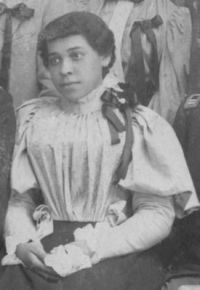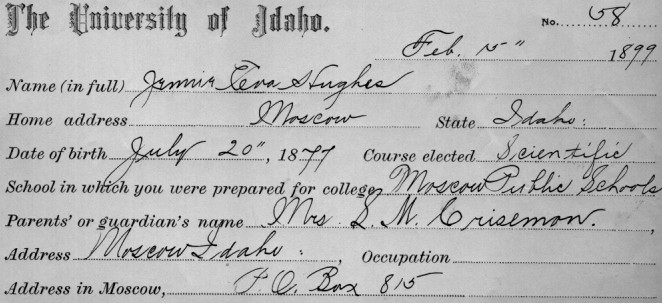Not of Noble Birth: The Triumph of Jennie Hughes Smith
February 2007
 |
| Jennie Eva Hughes at the time of her graduation from the University in 1899. |
Jennie Eva Hughes, Class of 1899, was the first African-American to graduate from the University of Idaho. She was born on July 20, 1879, in Washington, D.C. Little is known about Jennie’s father, Alexander Hughes, but it is known that her mother, Louisa, married Lewis E. Crisemon shortly after Jennie was born. Like other Americans during the 19th century, the Crisemon family moved westward, first to Pennsylvania, where daughter Gertrude was born, then to the Indian Territory (Oklahoma), where second daughter Lousinda was born, and finally to Idaho, where Louisa and Lewis’ third daughter, Carrie, was born.
Historically, it is interesting that the Crisemons migrated to what would become the state of Oklahoma. Were they Exodusters? During the Great Exodus, as this migration came to be known, thousands of black Americans left the eastern and southern states and migrated to those of the Midwest and Plains in the decades immediately following the Civil War. Oklahoma was particularly attractive to black Americans because, after the U.S. government had opened the Indian Territory to settlement by non-Indians, many black settlers pooled their land parcels to found all-black towns.
After a few years in the Indian Territory, Jennie’s family moved westward again; this time to Idaho, where, according to the Census of 1890, there were only 201 blacks in the entire state. The Crisemons settled in Moscow in the early 1890s; they were, in fact, Moscow’s first black family. While there is no doubt the family encountered prejudice of some sort, it is known that the Crisemons were well regarded in Moscow. Lewis was a successful businessman, operating either a restaurant or a barbershop – two occupations traditionally open to African-Americans on the western frontier. According to Jennie’s University of Idaho registration card dated September 23, 1898, her mother’s occupation was housekeeping. The card, however, incorrectly shows Jennie’s address in Moscow as Almond Street; probably Jennie and her family lived on Almon Street in the northwestern part of Moscow.
Although some western states restricted enrollment of black students in public schools, Jennie had not been prohibited from attending Moscow’s public schools. In fact, the registration card for her last semester at the University of Idaho, dated February 15, 1899, shows that she had been “prepared for college” in “Moscow Public Schools,” and she graduated from Moscow High School on April 26, 1895.
As a student at the University of Idaho, according to historian Keith Petersen in This Crested Hill: An Illustrated History of the University of Idaho, Jennie “accumulated an admirable academic record.” She won the prestigious Watkins Medal for Oratory in 1898, and graduated with a Bachelor of Science degree, one of seven students in the Class of 1899.
“Miss Jennie E. Hughes, ’99, will visit Oakland, Cal., during the summer,” reported the June 1899 Argonaut. The October 1899 Argonaut reported, “Jennie Hughes Smith is living in Wardner, Idaho.” Sometime between June and October, Jennie married George Augustus Smith. Little is known of George’s personal history; however, according to Petersen, George was a “railroad employee who had speculated in mining stock.” In her book, Idaho Ebony: The African-American Presence in Idaho State History, Mamie O. Oliver writes of “George Smith from Georgia.”
George and Jennie’s grandson, Kenneth Smith, understands that his grandfather had indeed been born in Georgia, and that the town of Augusta in Georgia had inspired his middle name. According to Oliver, George Smith was a “galena” or lead miner in Wardner. Kenneth adds that his grandfather was both a miner and a mine owner; among the mines he owned were the Little Pittsburgh, the Amy (or Amie) Matchless, and the Cougar. Kenneth also understands that George’s mother, Fanny, may have run a boarding house called the “Kellogg House.”
 |
| Jennie's registration card for her final term at the University. The specific year of Jennie's birth is unknown; on one record, it is 1879 but 1877 on this registration form. |
Despite the success George enjoyed in the Silver Valley, Jennie and George, and their four children, left Wardner and moved to Spokane, Washington in 1912. As Kenneth says, the Smiths departed, at least in part, because Jennie did not consider the rough-and-tumble atmosphere of the mining towns “a suitable place to raise children.” Jennie and George had three sons and one daughter. Berthold Augustus was born April 30, 1901; Amie, March 24, 1904; Leonard Wilbur, October 11, 1907; and Ralph Donald (Kenneth’s father) on April 4, 1911. Each of the Smith children, with the exception of Amy, graduated from high schools in the Spokane area. Sadly, Berthol, who was the second African-American student to enroll in the University of Idaho, died in 1919, while still a student. Leonard earned a law degree, probably from Gonzaga University in Spokane, and practiced as an attorney in that city. Kenneth’s father, Ralph, attended what was then Washington State College (now Washington State University) in Pullman, graduating in 1935 with a degree in Electrical Engineering.
Four years after her son Ralph graduated from Washington State College, on August 19, 1939, Jennie died at the age of 60 in Spokane. In a speech to her classmates at the time of their graduation, Jennie urged them to “occupy positions of usefulness.” Because Jennie left neither letters nor a diary, it is not known if Jennie herself believed her life had been one of usefulness. But there can be no dispute that history records Jennie as a remarkable woman who, at a time when less than one percent of Americans earned a bachelor’s degree, seized the opportunity of education, leaving a legacy of determination and distinction that enriches the lives of all Idahoans and all Americans.

 Email Special Collections:
Email Special Collections: Call Special Collections:
Call Special Collections: